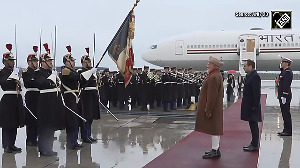It is becoming virtually impossible to guess who will win the Bihar assembly election.
Clearly, Railway Minister and Rashtriya Janata Dal chief Lalu Prasad has more people against him, both in politics and among the electorate, this time than ever before.
On the streets of Patna and Barauni, many curse him, others nod in assent.
| |||||||||||
Those who nod in assent are the workers, in the shops or in the farms (there is no industry in Bihar, but that is another story), who are in awe of their masters, or worse, fear losing their job for daring to air, or even hold, a contrarian view.
In a hotel near Begusarai district, from where roads go in four directions, a waiter agrees with his hotel receptionist-cum-manager: Lalu is a crook, he has done nothing, he will lose. The waiter, who I later learn is a Muslim and who doesn't want to be named, nods his head vigorously, insisting on repeating his boss' views.
Much later, when he comes to the hotel room to clear after my dinner, he insists that Lalu Prasad will not lose. "Saheb, no matter what people say on the streets, they will vote for him, especially the Muslims."
Earlier, Lalu Prasad won because of the support of the Yadavs and the Muslims, the former because he is of their caste, and the latter because he is the secularist supreme, the man who stopped Advani's rath yatra in 1990 and never let communalism rear its head in the state, not after the Babri Masjid was destroyed, not after Godhra.
It is something the Muslim masses haven't forgotten, even if the Muslim leadership, which appears to have been afflicted with amnesia, has appealed to the Muslims to vote against Lalu Prasad.
"Don't let anyone fool you," adds the waiter. "The poor Muslims (most Muslims in Bihar are very poor) will vote for him, but they are not saying it openly for fear of retribution."
He dismisses the Muslim leadership's appeal, saying they represent no one, least of all the common Muslim toiling away in some corner. "These leaders have been bought. Every leader in Bihar is corrupt, every one! So why should we trust them (the Muslim leadership)," he says.
Of course, there are Muslims on the streets who curse Lalu Prasad. "What has he done in 15 years? Where is the development? We are all migrating for lack of jobs here?" asks Aftab, a rickshaw-puller in Patna. He adds that the only reason he is not migrating is because he is now too old. Aftab says he is 45, but looks 60. A hard life has taken a heavy toll on him.
So will he vote against the RJD? Aftab hesitates, and then just says, "Let us see." Then he adds enigmatically, "I will decide once I am in the booth. I will press the button that catches my fancy."
For the Muslims, it is a question of survival and self-respect versus development. Given that they are among the poorest (only some Dalits are poorer), they desperately need development and jobs. But no one, just no one, ever wants jobs along with threat to one's self-respect.
This same choice is played out with the Yadavs and many other backward and scheduled castes (after Jharkhand split from Bihar, most of the Scheduled Tribes are to found in the new state south of Bihar).
This experience is perhaps also the reason why every pre-poll survey predicts that Lalu Prasad will lose, and then ends up embarrassingly wrong. The poor and the weak fear to air their views and so say what is expected of them, not what they intend to do.
This is not to say that Lalu Yadav will win this time; in fact the resentment against him is so strong that there is every chance of him losing or at least not doing well as subsequent reports will make clear. There is also growing resentment against some members of the Yadav caste, especially those who have traditionally been rich, as in the north-eastern parts like Madhepura and its surrounding belt, and are known to exploit the poor.
But it is to warn that never must one completely believe what one hears: Why should a poor villager, terrorised by others, ever say what is in his mind. How can he trust that the journalist or the pre-poll surveyor is not in the pay of the upper castes who, will make him pay for defying their wishes? Honesty is not the best policy but silence is golden.






 © 2025
© 2025